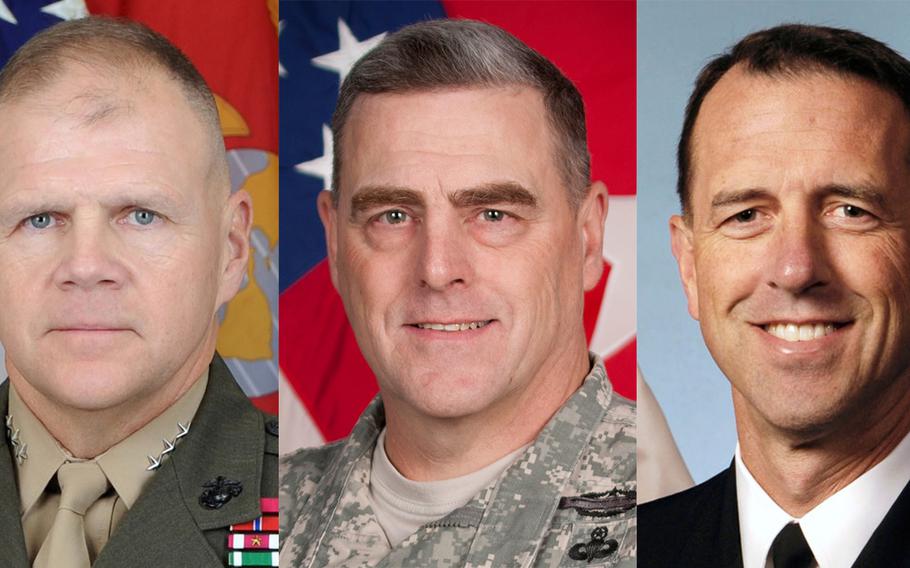
Lawmakers approved the Obama administration nominations of Robert Neller, left, as the Marine Corps commandant, Mark Milley, center, to be the Army chief of staff, and John Richardson as the chief of naval operations. (Stars and Stripes)
WASHINGTON — The Senate on Wednesday confirmed new uniformed leaders of the Army, Navy and Marine Corps, completing a change in the lineup for the Joint Chiefs of Staff.
After sometimes tense July hearings, lawmakers approved the Obama administration nominations of Gen. Mark Milley to be the Army chief of staff, Lt. Gen. Robert Neller as the Marine Corps commandant and Adm. John Richardson as the chief of naval operations during a closed-door vote before leaving Washington for a month-long August recess.
The men will lead the services and advise President Barack Obama as the United States navigates increasing tensions with Russia and wages a new war against the Islamic State in Iraq and Syria while shouldering tighter defense budgets — subjects that dominated their Capitol Hill confirmations.
Milley, 57, testified to the Senate in July that Russia is the top global threat to the U.S., echoing an earlier statement by Gen. Joseph Dunford that grabbed headlines during his confirmation before being named the new joint chiefs chairman.
“Russia is the only country on Earth that retains a nuclear capability to destroy the United States, so it’s an existential threat,” Milley told the Senate Armed Services Committee last month.
Milley is an Ivy League graduate and was the head of U.S. Army Forces Command when he was selected in May. He was commander general at III Corps and Fort Hood, Texas, and deployed to lead the International Security Assistance Force Joint Command in Afghanistan, according to an Army bio.
Neller, who replaces Dunford at the Marine Corps, was pressed by the committee — many of whom believe the Obama administration war effort is faltering — to weigh in on progress against the Islamic State in Iraq.
The general told lawmakers he believes the war has not shifted for at least a year, though he said the Iraqi security forces allied with the U.S. are not losing.
“I do not believe they are winning either. I believe they are at stalemate right now,” he said.
Neller led the I Marine Expeditionary Force in Anbar province from 2005-07 during the height of the war and helped foster the Sunni Awakening, which became a turning point for the U.S. fight against a bloody insurgency.
The Navy’s struggle with shrinking budgets and a limited number of ships came to forefront during Richardson’s confirmation hearing last week.
The admiral admitted that the service’s decision to pull an aircraft carrier from the Persian Gulf this fall for two months — the first gap in carrier presence there since 2007 — could hinder the war against the Islamic State.
“Without that carrier, that will be a detriment to our capability, yes, sir,” Richardson told the Senate committee.
Carriers provide a platform for the air campaign dropping ordnance on a daily basis on Iraq and Syria in support of allied ground forces. But increased demands in recent years on carrier strike groups has worn down the force and led the Joint Chiefs of Staff to schedule the gap in presence, according to the Navy.